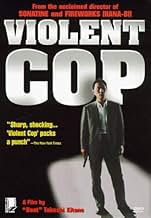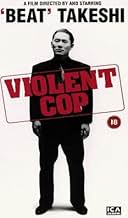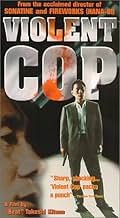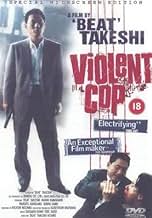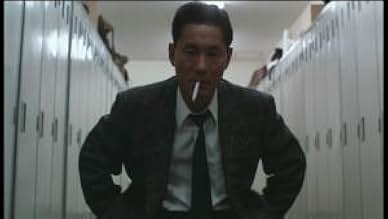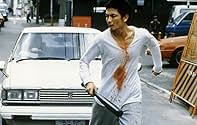CALIFICACIÓN DE IMDb
7.1/10
14 k
TU CALIFICACIÓN
Un policía propenso a la violencia descubre que su compañero está traficando con drogas.Un policía propenso a la violencia descubre que su compañero está traficando con drogas.Un policía propenso a la violencia descubre que su compañero está traficando con drogas.
- Dirección
- Guionistas
- Elenco
- Premios
- 3 premios ganados y 1 nominación en total
Takeshi Kitano
- Azuma
- (as Beat Takeshi)
Sei Hiraizumi
- Iwaki
- (as Shigeru Hiraizumi)
- Dirección
- Guionistas
- Todo el elenco y el equipo
- Producción, taquilla y más en IMDbPro
Opiniones destacadas
A shallow description would refer to this as a Japanese version of Dirty Harry. And it does bear some resemblance to that film, but while Dirty Harry broke the rules in order to get a criminal at any cost, Kitano's character Azuma seems to seek vengeance due not only to his lust for revenge but because he's psychotic. There's a sense that Azuma won't rest until he gets his man not out of duty but out of madness. Kitano gives what might be his best performance in this film; he is absolutely riveting. And the film itself is beautifully shot, and the score is especially good. But the best part of this is perhaps the end - the film ends on a perfectly cynical note that couldn't be topped. Seek this out.
Violent Cop is the first directorial work of comedian and television host Takeshi Kitano. He wasn't even supposed to do this job but when the initially hired director pulled out of the project due to scheduling conflicts, Takeshi Kitano took over and rewrote large parts of the script in the process. People must have been surprised when this film was initially released because it has nothing to do with Takeshi Kitano's quirky, funny and entertaining shows throughout the seventies and eighties. Violent Cop does its title justice and is brutal, cynical and nihilistic. It is often compared to the Dirty Harry franchise but while the titular hero of the American franchise is able to keep his cool, Takeshi Kitano's main character is unstable, unpredictable and pitiless.
Takeshi Kitano plays brutal veteran detective Azuma who doesn't show much respect for his superiors, colleagues and rookies. He treats criminals the way they would actually treat their victims. The opening sequence is quite revealing in that regard as the detective follows the leader of a group of teenagers who beat up a helpless old man and proceeds to beat him up in his parents' house. The only person this detective seems to care about is his fragile sister who spent time at a hospital to treat a head injury. Once we are introduced to the detective's life, the actual plot unfolds. The detective discovers that his partner is involved in drug trafficking but before he can conduct further investigations, his partner is found hanged under a bridge. Azuma understands that the suicide had been staged and tries to track down the boss of the drug trafficking ring by any means necessary.
The cinematography of this movie is very experimental and foreshadows Takeshi Kitano's later works. The movie has few dialogues and especially the main character prefers to use his fists before asking any questions. The movie features long moments of silence and static camera work before they are interrupted by hectic sequences and brutal acts of violence. The movie is quite brutal indeed and the body count rises quicker and quicker as the film progresses. Innocent bystanders get killed, a helpless homeless man gets beaten to pulp and even a pitiful woman gets executed. The film's conclusion is particularly cynical and nihilistic but offers an unexpected twist and some food for thought.
Fans of Japanese V-cinema and enthusiasts for brutal yakuza movies will adore Violent Cop. It has an intriguing atmosphere, unusual characters and lots of violence. Despite its cynical, nihilistic and pitiless attitude, the movie is never shallow and actually offers some food for thought. The film has aged quite well and shows the dark side of Japan's society.
Takeshi Kitano plays brutal veteran detective Azuma who doesn't show much respect for his superiors, colleagues and rookies. He treats criminals the way they would actually treat their victims. The opening sequence is quite revealing in that regard as the detective follows the leader of a group of teenagers who beat up a helpless old man and proceeds to beat him up in his parents' house. The only person this detective seems to care about is his fragile sister who spent time at a hospital to treat a head injury. Once we are introduced to the detective's life, the actual plot unfolds. The detective discovers that his partner is involved in drug trafficking but before he can conduct further investigations, his partner is found hanged under a bridge. Azuma understands that the suicide had been staged and tries to track down the boss of the drug trafficking ring by any means necessary.
The cinematography of this movie is very experimental and foreshadows Takeshi Kitano's later works. The movie has few dialogues and especially the main character prefers to use his fists before asking any questions. The movie features long moments of silence and static camera work before they are interrupted by hectic sequences and brutal acts of violence. The movie is quite brutal indeed and the body count rises quicker and quicker as the film progresses. Innocent bystanders get killed, a helpless homeless man gets beaten to pulp and even a pitiful woman gets executed. The film's conclusion is particularly cynical and nihilistic but offers an unexpected twist and some food for thought.
Fans of Japanese V-cinema and enthusiasts for brutal yakuza movies will adore Violent Cop. It has an intriguing atmosphere, unusual characters and lots of violence. Despite its cynical, nihilistic and pitiless attitude, the movie is never shallow and actually offers some food for thought. The film has aged quite well and shows the dark side of Japan's society.
There is no doubt in my mind that Takeshi Kitano is one of the greatest cinematic geniuses alive, and his nihilistic 1989 directorial debut is a fantastic proof for that. "Sono otoko, kyôbô ni tsuki" aka. "Violent Cop" is one of the rawest, most uncompromising cop films ever made, and, at the same time, arguably one of the most promising debut films ever delivered. Due to its 'unorthodox cop' premise, the film is often compared to films like the "Dirty Harry" series or "Bad Lieutennant". The stone-faced and irascible copper Azuma (brilliant performance by director Kitano, under his acting name 'Beat Takeshi'), is ten times dirtier than Harry ever was and incomparably more ruthless than the Baddest New York Lieutennant. Azuma could even give the ultra-unorthodox coppers in 70s Italian Poliziotteschi flicks a lesson in police violence. At least most violent cops in 70s exploitation cinema did what they did to protect society from scumbags, whilst Azuma does it out of anger, and he does not even bother asking questions before beating confessions out of criminals. Honestly, "Violent Cop" beats everything in the copper-flick field in its incredibly nihilistic premise, and yet it finds the time for slower moments, and Kitano's typically absurd and ingeniously black humor.
Detective Azuma (Kitano), and irascible homicide detective hates the criminal as he hates the crime, and he does not attempt to hide this attitude. His unorthodox methods, which include the severe beating of suspects, have caused him trouble with his superiors in the past, but Azuma does not seem to care. When ruthless Yakuza gangsters make things personal, they have to realize that they might have made an enemy whose relentlessness easily equals theirs...
I would love to further discuss the film's ingenious plot, but I do not want to spoil anything, as every true film lover should be able to experience the greatness of "Violent Cop". Unlike Kitano's other films, for which Kitano himself wrote the stories, this film is an adaptation of a novel by Hiashi Nozawa. Kitano's work, however, is ingenious, as screenwriter, director and leading man of this film. There is no other director who is capable of combining brutal nihilistic violence, tragedy and (black) comedy as effectively as Kitano does. Asked about the violence in his films in an interview, Kitano himself has once stated that nobody could possibly want to reproduce the violence seen in his films, simply because it is painful to look at. And it is true, hardly another director makes the pain caused by the violence as obvious as Kitano does. Kitano has a unique stamina when showing violence, which makes the viewer almost feel the pain. I don't want to spoil anything by giving an example - see this film and know what I am talking about. At the same time Kitano always has moments that are absurdly comical. As all Kitano protagonists, Azuma, even though an irascible and violent man, has a very odd sense of humor. His response to a barmaid's question what he does for a living is just one example for that. Also in a typical Kitano-manner, the film takes the time for slower parts in-between, like Azuma crossing a bridge for example.
Kitano is as great as leading man as he is as director here. His stoic performance as Azuma is brilliant. The stone-faced copper always has a poker face, but it is nonetheless obvious that he is boiling in fury - how many other actors could be predestined for a role like this as Kitano is. No one, in my opinion. It is Kitano's performance which carries this film, and yet the other performances are also excellent. Hakuryu is particularly excellent as a sadistic Yakuza hit-man. Maiko Kawakami is also very convincing as Azuma's mentally disturbed sister. The rest of the cast includes several great character actors who have since become regulars in Kitano's films, such as Ittoku Kishihe as a Yakuza boss or Makoto Ashikawa as Azuma's young colleague. Lovers of Italian cult-cinema, by the way will be delighted to see a scene in which Kitano brilliantly pays tribute to Sergio Martino's Giallo "La Coda Dello Scorpione" (1971). "Violent Cop" is greatly shot and accompanied by an insanely brilliant score. Kitano's use of music in his films is another part of his brilliance, and really has to be experienced instead of explained.
All said, "Violent Cop" is a unique cinematic experience that must not be missed. Ultraviolent, nihilistic, sometimes slow in detail and more often fast and incredibly raw, brutal, sometimes tragic and sometimes oddly comical, this is the uncompromising masterpiece that marks the beginning in the cinematic career of one of today's most brilliant filmmakers. And, apart from his unmatched 1997 masterpiece "Hana-Bi" (aka. "Fireworks"), Kitano's debut still ranks among his greatest accomplishments. A true must!
Detective Azuma (Kitano), and irascible homicide detective hates the criminal as he hates the crime, and he does not attempt to hide this attitude. His unorthodox methods, which include the severe beating of suspects, have caused him trouble with his superiors in the past, but Azuma does not seem to care. When ruthless Yakuza gangsters make things personal, they have to realize that they might have made an enemy whose relentlessness easily equals theirs...
I would love to further discuss the film's ingenious plot, but I do not want to spoil anything, as every true film lover should be able to experience the greatness of "Violent Cop". Unlike Kitano's other films, for which Kitano himself wrote the stories, this film is an adaptation of a novel by Hiashi Nozawa. Kitano's work, however, is ingenious, as screenwriter, director and leading man of this film. There is no other director who is capable of combining brutal nihilistic violence, tragedy and (black) comedy as effectively as Kitano does. Asked about the violence in his films in an interview, Kitano himself has once stated that nobody could possibly want to reproduce the violence seen in his films, simply because it is painful to look at. And it is true, hardly another director makes the pain caused by the violence as obvious as Kitano does. Kitano has a unique stamina when showing violence, which makes the viewer almost feel the pain. I don't want to spoil anything by giving an example - see this film and know what I am talking about. At the same time Kitano always has moments that are absurdly comical. As all Kitano protagonists, Azuma, even though an irascible and violent man, has a very odd sense of humor. His response to a barmaid's question what he does for a living is just one example for that. Also in a typical Kitano-manner, the film takes the time for slower parts in-between, like Azuma crossing a bridge for example.
Kitano is as great as leading man as he is as director here. His stoic performance as Azuma is brilliant. The stone-faced copper always has a poker face, but it is nonetheless obvious that he is boiling in fury - how many other actors could be predestined for a role like this as Kitano is. No one, in my opinion. It is Kitano's performance which carries this film, and yet the other performances are also excellent. Hakuryu is particularly excellent as a sadistic Yakuza hit-man. Maiko Kawakami is also very convincing as Azuma's mentally disturbed sister. The rest of the cast includes several great character actors who have since become regulars in Kitano's films, such as Ittoku Kishihe as a Yakuza boss or Makoto Ashikawa as Azuma's young colleague. Lovers of Italian cult-cinema, by the way will be delighted to see a scene in which Kitano brilliantly pays tribute to Sergio Martino's Giallo "La Coda Dello Scorpione" (1971). "Violent Cop" is greatly shot and accompanied by an insanely brilliant score. Kitano's use of music in his films is another part of his brilliance, and really has to be experienced instead of explained.
All said, "Violent Cop" is a unique cinematic experience that must not be missed. Ultraviolent, nihilistic, sometimes slow in detail and more often fast and incredibly raw, brutal, sometimes tragic and sometimes oddly comical, this is the uncompromising masterpiece that marks the beginning in the cinematic career of one of today's most brilliant filmmakers. And, apart from his unmatched 1997 masterpiece "Hana-Bi" (aka. "Fireworks"), Kitano's debut still ranks among his greatest accomplishments. A true must!
Just the way the Takeshi's character comes across?
I think he crosses the line from being a rogue cop who pushes the boat out to get results. He comes across as not being able to communicate well with any other characters in the film (much like De Niros sociopathic turn as Travis Bickle).
Something about his constant borrowing money with no intention of paying it back and seeming lack of fear almost makes him seem suicidal.
I think that and the general bleak tone of the film, the fact that there's something inherently depressive and explosively violent about Takeshi's character just reminded me of Taxi Driver.
Anyone else?
I think he crosses the line from being a rogue cop who pushes the boat out to get results. He comes across as not being able to communicate well with any other characters in the film (much like De Niros sociopathic turn as Travis Bickle).
Something about his constant borrowing money with no intention of paying it back and seeming lack of fear almost makes him seem suicidal.
I think that and the general bleak tone of the film, the fact that there's something inherently depressive and explosively violent about Takeshi's character just reminded me of Taxi Driver.
Anyone else?
Kitano cripples the senses and jars the nerves in his films. This is a movie about a two-fisted cop whose blunt face and cliff's edge personality drive every scene, even the ones Kitano is not in. Kitano's character is not reacting to a violent world, but infecting it with his own brand of violence. The "violent cop" has lost his hope, therefore he fears nothing.
Kitano as director gives us a real world of humor and interaction. Events happen, there's no plot. Every scene has this pulse that is raging, the characters even when still seem kinetic as sprinters. Punches, kicks, and bullets explode bodies. Kitano's character clashes with a psychotic hit man, but it is Kitano's cop who is out of control, unstoppable in his desire to inflict justice as he sees it.
There's scenes which cannot be forgotten: Kitano's cop
interrogates a punk drug dealer in a club rest room. These two actors go through a scene in which Kitano slaps this man over and over until he talks. The difference is that Kitano is really slapping this actor, and slapping living hell out of him. Cringe-worthy, and up there with one of the other scenes that illustrates what a hard man Kitano is: stabbed with a knife, Kitano grips the blade as it comes out of him, clinching his fist down on it so he cannot be stabbed again. Blood pours out from between his fingers, he cannot let it go because his fist and knife are one; Kitano understands the brutality of the fight, the reality of two men trying to kill each other, no quips, no words, no yells or curses, just blood and rage; cut to the bone, it's the way the whole film makes you feel.
As far as the recent BROTHER is concerned, it makes perfect sense for Kitano to use similar themes seen in his earlier films. BROTHER is Kitano's first real attack on American audiences. They, en mass, haven't seen his stuff, and if Kitano's going over old ground, he's doing it in HIS style. Better a retread Kitano than most of Hollywood's slobbering star-cramped idiocy.
Kitano as director gives us a real world of humor and interaction. Events happen, there's no plot. Every scene has this pulse that is raging, the characters even when still seem kinetic as sprinters. Punches, kicks, and bullets explode bodies. Kitano's character clashes with a psychotic hit man, but it is Kitano's cop who is out of control, unstoppable in his desire to inflict justice as he sees it.
There's scenes which cannot be forgotten: Kitano's cop
interrogates a punk drug dealer in a club rest room. These two actors go through a scene in which Kitano slaps this man over and over until he talks. The difference is that Kitano is really slapping this actor, and slapping living hell out of him. Cringe-worthy, and up there with one of the other scenes that illustrates what a hard man Kitano is: stabbed with a knife, Kitano grips the blade as it comes out of him, clinching his fist down on it so he cannot be stabbed again. Blood pours out from between his fingers, he cannot let it go because his fist and knife are one; Kitano understands the brutality of the fight, the reality of two men trying to kill each other, no quips, no words, no yells or curses, just blood and rage; cut to the bone, it's the way the whole film makes you feel.
As far as the recent BROTHER is concerned, it makes perfect sense for Kitano to use similar themes seen in his earlier films. BROTHER is Kitano's first real attack on American audiences. They, en mass, haven't seen his stuff, and if Kitano's going over old ground, he's doing it in HIS style. Better a retread Kitano than most of Hollywood's slobbering star-cramped idiocy.
¿Sabías que…?
- TriviaTakeshi Kitano insisted on long takes. Close-ups easily lasted 10 seconds, medium shots went on for 20 seconds and the shot where Azuma (Kitano) walks onto the bridge and into the frame lasted 57 seconds.
- ErroresBoom mic visible from behind a car at 49:28 as Iwaki approaches Azuma.
- Citas
Azuma: Turn yourself in tomorrow.
Delinquent Kid: I didn't do anything!
Azuma: You didn't do anything?
[Rams kid's head into the wall.]
Azuma: Well, then I didn't do anything either!
- Créditos curiososThere are no opening credits beyond the title.
- Versiones alternativasWhen the film was released in Swedish cinemas in 1992, it was censored with a little more than one minute for violence, the cuts were made in the following scenes:
- The policeman getting assaulted before he gets his head crushed by a baseball bat.
- The scene where Azuma assaults Hazishume on the toilet, and the finger cutting sequence.
- The following cuts are when Azuma assaults the killer in the locker room and a bloody execution scene at the end.
- ConexionesFeatured in Siete psicopatas y un perro (2012)
- Bandas sonorasGnossienne No.1
(1890)
Main theme is an electronic variation of the above title by Erik Satie
Arranged by Daisaku Kume
Performed by Daisaku Kume
Produced by Kazuyoshi Okuyama
Courtesy by Vap Inc.
Selecciones populares
Inicia sesión para calificar y agrega a la lista de videos para obtener recomendaciones personalizadas
- How long is Violent Cop?Con tecnología de Alexa
Detalles
Taquilla
- Total en EE. UU. y Canadá
- USD 1,960
- Tiempo de ejecución1 hora 43 minutos
- Color
- Relación de aspecto
- 1.85 : 1
Contribuir a esta página
Sugiere una edición o agrega el contenido que falta

Principales brechas de datos
By what name was Sono otoko, kyôbô ni tsuki (1989) officially released in Canada in French?
Responda


